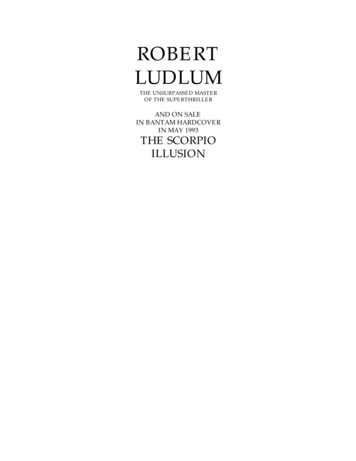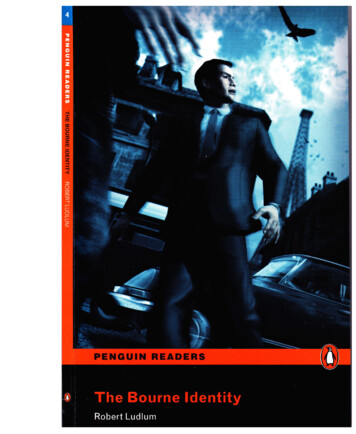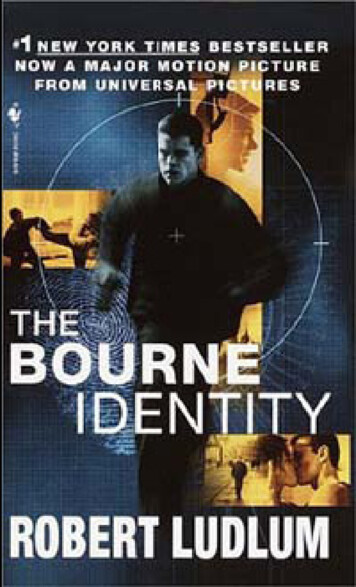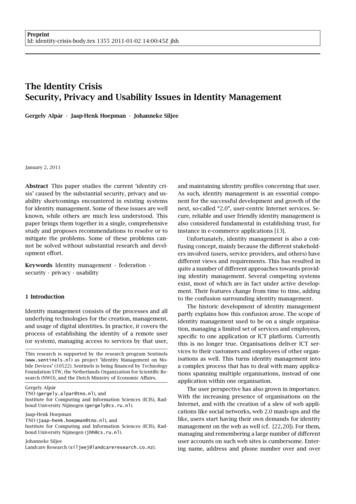
Transcription
ROBERTLUDLUMTHE UNSURPASSED MASTEROF THE SUPERTHRILLERAND ON SALEIN BANTAM HARDCOVERIN MAY 1993THE SCORPIOILLUSION
THE AMNESIAC REMEMBERS“You appear to be a mass of contradictions,” Dr. Washburn said. “There’s a subsurface violencealmost always in control, but very much alive. There’s also a pensiveness that seems painful for you,yet you rarely give vent to the anger that pain must provoke.”“You’re provoking it now,” said the man.“And we’ll continue to do so, as long as there’s progress.”“I wasn’t aware any progress had been made.”“Not in terms of an identity or an occupation. But we are finding out what’s most comfortablefor you, what you deal with best. It’s a little frightening.”“In what way?”“Let me give you an example.” The doctor put the clipboard down and got out of the chair. Hewalked to a primitive cupboard against the wall, opened a drawer, and took out a large automatichandgun. The man with no memory tensed in his chair; Washburn was aware of the reaction. “I’venever used this, not sure I’d know how to, but I do live on the waterfront.” He smiled, thensuddenly, without warning, threw it to the man. The weapon was caught in midair, the catch clean,swift, and confident. Break it down; I believe that’s the phrase.”“What?”“Break it down. Now.”The man looked at the gun. And then, in silence, his hands and fingers moved expertly over theweapon. In less than thirty seconds it was completely dismantled.
Bantam Books by Robert LudlumAsk your bookseller for the books you have missedTHE AQUITAINE PROGRESSIONTHE BOURNE IDENTITYTHE BOURNE SUPREMACYTHE BOURNE ULTIMATUMTHE CHANCELLOR MANUSCRIPTTHE GEMINI CONTENDERSTHE HOLCROFT COVENANTTHE ICARUS AGENDATHE MATARESE CIRCLETHE MATLOCK PAPERTHE OSTERMAN WEEKENDTHE PARSIFAL MOSAICTHE RHINEMANN EXCHANGETHE ROAD TO GANDOLFOTHE ROAD TO OMAHATHE SCARLATTI INHERITANCETREVAYNE
THEBOURNEIDENTITYROBERT LUDLUMBANTAM BOOKSNEW YORK ?TORONTO ?SYDNEY ?AUKLAND
This edition contains the complete textof the original hardcover edition.NOT ONE WORD HAS BEEN OMITTED.THE BOURNE IDENTITYA Bantam Book / published byarrangement with the authorPUBLISHING HISTORYMarek Edition published March 1980A Selection of Literary Guild, April 1980, anda Doubleday Book Club Selection, June 1980Serialized in Book Digest, Spring 1980Bantam edition / March 1981Acknowledgment and thanks are made for permission to reprint articlesfrom: The Associated Press, 1975 by The Associated Press. The New YorkTimes, 1975 by The New York Times Company.All rights reserved.Copyright 1980 by Robert Ludlum.Cover artwork copyright 1988 by Bantam Books.No part of this book may be reproduced or transmittedin any form or by any means, electronic or mechanical,including photocopying, recording, or by any informationstorage and retrieval system, without permission in writingfrom the publisher.For information address: Bantam Books.If you purchased this book without a cover you should be aware that this book is stolen property. It was reported as “unsold and destroyed” to thepublisher and neither the author nor the publisher has received any payment for this “stripped book.”ISBN 0-553-26011-1Published simultaneously in the United States and Canada.Bantam Books are published by Bantam Books, a division of Bantam Doubleday Dell Publishing Group, Inc. Its trademark, consisting of the words“Bantam Books” and the portrayal of a rooster, is Registered in U.S. Patent and Trademark Office and in other countries. Marca Registrada. BantamBooks, 1540 Broadway, New York, New York 10036.PRINTED IN THE UNITED STATES OF AMERICARAD 36 35 34 33 32
For GlynisA very special light we all adore.With our love and deep respect.
PREFACEThe New York TimesFriday, July 11, 1975FRONT PAGEDIPLOMATS SAID TO BE LINKEDWITH FUGITIVE TERRORISTKNOWN AS CARLOSPARIS , July 10—France expelled three high-ranking Cuban diplomats today in connectionwith the worldwide search for a man called Carlos, who is believed to be an important link inan international terrorist network.The suspect, whose real name is thought to be Ilich Ramirez Sanchez, is being sought inthe killing of two French counterintelligence agents and a Lebanese informer at a LatinQuarter apartment on June 27.The three killings have led the police here and in Britain to what they feel is the trail of amajor network of international terrorist agents. In the search for Carlos after the killings,French and British policemen discovered large arms caches that linked Carlos to majorterrorism in West Germany and led them to suspect a connection between many terroristacts throughout Europe.Reported Seen in LondonSince then Carlos has been reported seen in London and in Beirut, Lebanon. Associated PressMonday, July 7, 1975syndicated dispatchA DRAGNET FOR ASSASSINLONDON (AP)—Guns and girls, grenades and good suits, a fat billfold, airline tickets toromantic places and nice apartments in a half dozen world capitals. This is the portraitemerging of a jet age assassin being sought in an international manhunt.The hunt began when the man answered his doorbell in Paris and shot dead two Frenchintelligence agents and a Lebanese informer. It has put four women into custody in twocapitals, accused of offenses in his wake. The assassin himself has vanished—perhaps inLebanon, the French police believe.In the past few days in London, those acquainted with him have described him toreporters as good looking, courteous, well educated, wealthy and fashionably dressed.But his associates are men and women who have been called the most dangerous in theworld. He is said to be linked with the Japanese Red Army, the Organization for the ArmedArab Struggle, the West German Baader-Meinhof gang, the Quebec Liberation Front, theTurkish Popular Liberation Front, separatists in France and Spain, and the Provisional wingof the Irish Republican Army.When the assassin traveled—to Paris, to the Hague, to West Berlin—bombs went off;guns cracked and there were kidnappings.
A breakthrough occurred in Paris when a Lebanese terrorist broke under questioning andled two intelligence men to the assassin’s door in Paris on June 27. He shot all three to deathand escaped. Police found his guns and notebooks containing “death lists” of prominentpeople.Yesterday the London Observer said police were hunting for the son of a VenezuelanCommunist lawyer for questioning in the triple slaying. Scotland Yard said, “We are notdenying the report,” but added there was no charge against him and he was wanted only forquestioning.The Observer identified the hunted man as Ilich Ramirez Sanchez, of Caracas. It said hisname was on one of the four passports found by French police when they raided the Parisapartment where the slayings took place.The newspaper said Ilich was named after Vladimir Ilych Lenin, founder of the Sovietstate, and was educated in Moscow and speaks fluent Russian.In Caracas, a spokesman for the Venezuelan Communist Party said Ilich is the son of a70-year-old Marxist lawyer living 450 miles west of Caracas, but “neither father nor sonbelong to our party.”He told reporters he did not know where Ilich was now.
BOOK I1The trawler plunged into the angry swells of the dark, furious sea like an awkward animal tryingdesperately to break out of an impenetrable swamp. The waves rose to goliathan heights, crashinginto the hull with the power of raw tonnage; the white sprays caught in the night sky cascadeddownward over the deck under the force of the night wind. Everywhere there were the sounds ofinanimate pain, wood straining against wood, ropes twisting, stretched to the breaking point. Theanimal was dying.Two abrupt explosions pierced the sounds of the sea and the wind and the vessel’s pain. Theycame from the dimly lit cabin that rose and fell with its host body. A man lunged out of the doorgrasping the railing with one hand, holding his stomach with the other.A second man followed, the pursuit cautious, his intent violent. He stood bracing himself in thecabin door; he raised a gun and fired again. And again.The man at the railing whipped both his hands up to his head, arching backward under theimpact of the fourth bullet. The trawler’s bow dipped suddenly into the valley of two giant waves,lifting the wounded man off his feet; he twisted to his left unable to take his hands away from hishead. The boat surged upward, bow and midships more out of the water than in it, sweeping thefigure in the doorway back into the cabin, a fifth gunshot fired wildly. The wounded man screamed,his hands now lashing out at anything he could grasp, his eyes blinded by blood and the unceasingspray of the sea. There was nothing he could grab, so he grabbed at nothing; his legs buckled as hisbody lurched forward. The boat rolled violently leeward and the man whose skull was ripped openplunged over the side into the madness of the darkness below.He felt rushing cold water envelop him, swallowing him, sucking him under, and twisting him incircles, then propelling him up to the surface—only to gasp a single breath of air. A gasp and he wasunder again.And there was heat, a strange moist heat at his temple that seared through the freezing water thatkept swallowing him, a fire where no fire should burn. There was ice, too; an icelike throbbing in hisstomach and his legs and his chest, oddly warmed by the cold sea around him. He felt these things,acknowledging his own panic as he felt them. He could see his own body turning and twisting, armsand feet working frantically against the pressures of the whirlpool. He could feel, think, see, perceivepanic and struggle—yet strangely there was peace. It was the calm of the observer, the uninvolvedobserver, separated from the events, knowing of them but not essentially involved.Then another form of panic spread through him, surging through the heat and the ice and theuninvolved recognition. He could not submit to peace! Not yet! It would happen any second now;he was not sure what it was, but it would happen. He had to be there!He kicked furiously, clawing at the heavy walls of water above, his chest burning. He brokesurface, thrashing to stay on top of the black swells. Climb up! Climb up!A monstrous rolling wave accommodated; he was on the crest, surrounded by pockets of foamand darkness. Nothing. Turn! Turn!It happened. The explosion was massive; he could hear it through the clashing waters and thewind, the sight and the sound somehow his doorway to peace. The sky lit up like a fiery diadem and
within that crown of fire, objects of all shapes and sizes were blown through the light into the outershadows.He had won. Whatever it was, he had won.Suddenly he was plummeting downward again, into an abyss again. He could feel the rushingwaters crash over his shoulders, cooling the white-hot heat at his temple, warming the ice-coldincisions in his stomach and his legs and. His chest. His chest was in agony! He had been struck—the blow crushing, the impact suddenand intolerable. It happened again! Let me alone. Give me peace.And again!And he clawed again, and kicked again until he felt it. A thick, oily object that moved onlywith the movements of the sea. He could not tell what it was, but it was there and he could feel it,hold it.Hold it! It will ride you to peace. To the silence of darkness and peace.The rays of the early sun broke through the mists of the eastern sky, lending glitter to the calmwaters of the Mediterranean. The skipper of the small fishing boat, his eyes bloodshot, his handsmarked with rope burns, sat on the stern gunnel smoking a Gauloise, grateful for the sight of thesmooth sea. He glanced over at the open wheelhouse; his younger brother was easing the throttleforward to make better time, the single other crewman checking a net several feet away. They werelaughing at something and that was good; there had been nothing to laugh about last night. Wherehad the storm come from? The weather reports from Marseilles had indicated nothing; if they hadhe would have stayed in the shelter of the coastline. He wanted to reach the fishing grounds eightykilometers south of La Seyne-sur-Mer by daybreak, but not at the expense of costly repairs, andwhat repairs were not costly these days?Or at the expense of his life, and there were moments last night when that was a distinctconsideration.“Tu es fatigué, hein, mon frère?” his brother shouted, grinning at him. “Va te coucher maintenant. Laissemoi faire.”“D’accord,” the brother answered, throwing his cigarette over the side and sliding down to thedeck on top of a net “A little sleep won’t hurt.”It was good to have a brother at the wheel. A member of the family should always be the pilot ona family boat; the eyes were sharper. Even a brother who spoke with the smooth tongue of a literateman as opposed to his own coarse words. Crazy! One year at the university and his brother wishedto start a compagnie. With a single boat that had seen better days many years ago. Crazy. What gooddid his books do last night? When his compagnie was about to capsize.He closed his eyes, letting his hands soak in the rolling water on the deck. The salt of the seawould be good for the rope burns. Burns received while lashing equipment that did not care to stayput in the storm.“Look! Over there!”It was his brother; apparently sleep was to be denied by sharp family eyes.“What is it?” he yelled.“Port bow! There’s a man in the water! He’s holding on to something! A piece of debris, a plankof some sort.”The skipper took the wheel, angling the boat to the right of the figure in the water, cutting theengines to reduce the wake. The man looked as though the slightest motion would send him slidingoff the fragment of wood he clung to; his hands were white, gripped around the edge like claws, butthe rest of his body was limp—as limp as a man fully drowned, passed from this world.
“Loop the ropes!” yelled the skipper to his brother and the crewman. “Submerge them aroundhis legs. Easy now! Move them up to his waist. Pull gently.”“His hands won’t let go of the plank!”“Reach down! Pry them up! It may be the death lock.”“No. He’s alive . but barely, I think. His lips move, but there’s no sound. His eyes also, though Idoubt he sees us.”“The hands are free!”“Lift him up. Grab his shoulders and pull him over. Easy, now!”“Mother of God, look at his head!” yelled the crewman. “It’s split open.”“He must have crashed it against the plank in the storm,” said the brother.“No,” disagreed the skipper, staring at the wound. “It’s a clean slice, razorlike. Caused by a bullet;he was shot.”“You can’t be sure of that.”“In more than one place,” added the skipper, his eyes roving over the body. “We’ll head for Ilede Port Noir; it’s the nearest island. There’s a doctor on the waterfront.”“The Englishman?”“He practices.”“When he can,” said the skipper’s brother. “When the wine lets him. He has more success withhis patients’ animals than with his patients.”“It won’t matter. This will be a corpse by the time we get there. If by chance he lives, I’ll bill himfor the extra petrol and whatever catch we miss. Get the kit; we’ll bind his head for all the good itwill do.”“Look!” cried the crewman. “Look at his eyes.”“What about them?” asked the brother.“A moment ago they were gray—as gray as steel cables. Now they’re blue!”“The sun’s brighter,” said the skipper, shrugging. “Or it’s playing tricks with your own eyes. Nomatter, there’s no color in the grave.”Intermittent whistles of fishing boats clashed with the incessant screeching of the gulls; togetherthey formed the universal sounds of the waterfront. It was late afternoon, the sun a fireball in thewest, the air still and too damp, too hot. Above the piers and facing the harbor was a cobblestonestreet and several blemished white houses, separated by overgrown grass shooting up from driedearth and sand. What remained of the verandas were patched latticework and crumbling stuccosupported by hastily implanted pilings. The residences had seen better days a number of decades agowhen the residents mistakenly believed Ile de Port Noir might become another Mediterraneanplayground. It never did.All the houses had paths to the street, but the last house in the row had a path obviously moretrampled than the others. It belonged to an Englishman who had come to Port Noir eight yearsbefore under circumstances no one understood or cared to; he was a doctor and the waterfront hadneed of a doctor. Hooks, needles and knives were at once means of livelihood as well as instrumentsof incapacitation. If one saw le docteur on a good day, the sutures were not too bad. On the otherhand, if the stench of wine or whiskey was too pronounced, one took one’s chances.Tant pis! He was better than no one.But not today; no one used the path today. It was Sunday and it was common knowledge that onany Saturday night the doctor was roaring drunk in the village, ending the evening with whateverwhore was available. Of course, it was also granted that during the past few Saturdays the doctor’sroutine had altered; he had not been seen in the village. But nothing ever changed that much; bottlesof scotch were sent to the doctor on a regular basis. He was simply staying in his house; he had been
doing so since the fishing boat from La Ciotat had brought in the unknown man who was morecorpse than man.Dr. Geoffrey Washburn awoke with a start, his chin settled into his collarbone causing the odorof his mouth to invade his nostrils; it was not pleasant. He blinked, orienting himself, and glanced atthe open bedroom door. Had his nap been interrupted by another incoherent monologue from hispatient? No; there was no sound. Even the gulls outside were mercifully quiet; it was Ile de PortNoir’s holy day, no boats coming in to taunt the birds with their catches.Washburn looked at the empty glass and the half-empty bottle of whiskey on the table beside hischair. It was an improvement. On a normal Sunday both would be empty by now, the pain of theprevious night having been spiraled out by the scotch. He smiled to himself, once again blessing anolder sister in Coventry who made the scotch possible with her monthly stipend. She was a goodgirl, Bess was, and God knew she could afford a hell of a lot more than she sent him, but he wasgrateful she did what she did. And one day she would stop, the money would stop, and then theoblivions would be achieved with the cheapest wine until there was no pain at all. Ever.He had come to accept that eventuality . until three weeks and five days ago when the half-deadstranger had been dragged from the sea and brought to his door by fishermen who did not care toidentify themselves. Their errand was one of mercy, not involvement. God would understand; theman had been shot.What the fishermen had not known was that far more than bullets had invaded the man’s body.And mind.The doctor pushed his gaunt frame out of the chair and walked unsteadily to the windowoverlooking the harbor. He lowered the blind, closing his eyes to block out the sun, then squintedbetween the slats to observe the activity in the street below, specifically the reason for the clatter. Itwas a horse-drawn cart, a fisherman’s family out for a Sunday drive. Where the hell else could onesee such a sight? And then he remembered the carriages and the finely groomed geldings thatthreaded through London’s Regent Park with tourists during the summer months; he laughed outloud at the comparison. But his laughter was short-lived, replaced by something unthinkable threeweeks ago. He had given up all hope of seeing England again. It was possible that might be changednow. The stranger could change it.Unless his prognosis was wrong, it would happen any day, any hour or minute. The wounds tothe legs, stomach, and chest were deep and severe, quite possibly fatal were it not for the fact thebullets had remained where they had lodged, self-cauterized and continuously cleansed by the sea.Extracting them was nowhere near as dangerous as it might have been, the tissue primed, softened,sterilized, ready for an immediate knife. The cranial wound was the real problem; not only was thepenetration subcutaneous, but it appeared to have bruised the thalamus and hippocampus fibrousregions. Had the bullet entered millimeters away on either side the vital functions would haveceased; they had not been impeded, and Washburn had made a decision. He went dry for thirty-sixhours, eating as much starch and drinking as much water as was humanly possible. Then heperformed the most delicate piece of work he had attempted since his dismissal from MacleansHospital in London. Millimeter by agonizing millimeter he had brush-washed the fibrous areas, thenstretched and sutured the skin over the cranial wound, knowing that the slightest error with brush,needle, or clamp would cause the patient’s death.He had not wanted this unknown patient to die for any number of reasons. But especially one.When it was over and the vital signs had remained constant, Dr. Geoffrey Washburn went backto his chemical and psychological appendage. His bottle. He had gotten drunk and he had remaineddrunk, but he had not gone over the edge. He knew exactly where he was and what he was doing atall times. Definitely an improvement.
Any day now, any hour perhaps, the stranger would focus his eyes and intelligible words wouldemerge from his lips.Even any moment.The words came first. They floated in the air as the early morning breeze off the sea cooled theroom.“Who’s there? Who’s in this room?”Washburn sat up in the cot, moved his legs quietly over the side, and rose slowly to his feet. Itwas important to make no jarring note, no sudden noise or physical movement that might frightenthe patient into a psychological regression. The next few minutes would be as delicate as the surgicalprocedures he had performed; the doctor in him was prepared for the moment.“A friend,” he said softly.“Friend?”“You speak English. I thought you would. American or Canadian is what I suspected. Yourdental work didn’t come from the UK or Paris. How do you feel?”“I’m not sure.”“It will take awhile. Do you need to relieve your bowels?”“What?”“Take a crapper, old man. That’s what the pan’s for beside you. The white one on your left.When we make it in time, of course.”“I’m sorry.”“Don’t be. Perfectly normal function. I’m a doctor, your doctor. My name is GeoffreyWashburn. What’s yours?”“What?”“I asked you what your name was.”The stranger moved his head and stared at the white wall streaked with shafts of morning light.Then he turned back, his blue eyes leveled at the doctor. “I don’t know.”“Oh, my God.”“I’ve told you over and over again. It will take time. The more you fight it, the more you crucifyyourself, the worse it will be.”“You’re drunk.”“Generally. It’s not pertinent. But I can give you clues, if you’ll listen.”“I’ve listened”“No, you don’t; you turn away. You lie in your cocoon and pull the cover over your mind. Hearme again.”“I’m listening.”“In your coma—your prolonged coma—you spoke in three different languages. English, Frenchand some goddamned twangy thing I presume is Oriental. That means you’re multilingual; you’re athome in various parts of the world. Think geographically. What’s most comfortable for you?”“Obviously English.”“We’ve agreed to that. So what’s most uncomfortable?”“I don’t know.”“Your eyes are round, not sloped. I’d say obviously the Oriental.”“Obviously.”“Then why do you speak it? Now, think in terms of association. I’ve written down words; listento them. I’ll say them phonetically. Ma-kwa. Tam-kwon. Kee-sah. Say the first thing that comes tomind.”
“Nothing.”“Good show.”“What the hell do you want?”“Something. Anything.”“You’re drunk.”“We’ve agreed to that. Consistently. I also saved your bloody life. Drunk or not, I am a doctor. Iwas once a very good one.”“What happened?”“The patient questions the doctor?”“Why not?”Washburn paused, looking out the window at the waterfront. “I was drunk,” he said. “They said Ikilled two patients on the operating table because I was drunk. I could have gotten away with one.Not two. They see a pattern very quickly, God bless them. Don’t ever give a man like me a knife andcloak it in respectability.”“Was it necessary?”“Was what necessary?”“The bottle.”“Yes, damn you,” said Washburn softly, turning from the window. “It was and it is. And thepatient is not permitted to make judgments where the physician is concerned.”“Sorry.”“You also have an annoying habit of apologizing. It’s an overworked protestation and not at allnatural. I don’t for a minute believe you’re an apologetic person.”“Then you know something I don’t know.”“About you, yes. A great deal. And very little of it makes sense.”The man sat forward in the chair. His open shirt fell away from his taut frame, exposing thebandages on his chest and stomach. He folded his hands in front of him, the veins in his slender,muscular arms pronounced. “Other than the things we’ve talked about?”“Yes.”“Things I said while in coma?”“No, not really. We’ve discussed most of that gibberish. The languages, your knowledge ofgeography—cities I’ve never or barely heard of—your obsession for avoiding the use of names,names you want to say but won’t; your propensity for confrontation—attack, recoil, hide, run—allrather violent, I might add. I frequently strapped your arms down, to protect the wounds. But we’vecovered all that. There are other things.”“What do you mean? What are they? Why haven’t you told me?”“Because they’re physical. The outer shell, as it were. I wasn’t sure you were ready to hear. I’mnot sure now.”The man leaned back in the chair, dark eyebrows below the dark brown hair joined in irritation.“Now it’s the physician’s judgment that isn’t called for. I’m ready. What are you talking about?”“Shall we begin with that rather acceptable looking head of yours? The face, in particular.”“What about it?”“It’s not the one you were born with.”“What do you mean?”“Under a thick glass, surgery always leaves its mark. You’ve been altered, old man.”“Altered?”“You have a pronounced chin; I daresay there was a cleft in it. It’s been removed. Your upper leftcheekbone—your cheekbones are also pronounced, conceivably Slavic generations ago—has minutetraces of a surgical scar. I would venture to say a mole was eliminated. Your nose is an English nose,
at one time slightly more prominent than it is now. It was thinned ever so subtly. Your very sharpfeatures have been softened, the character submerged. Do you understand what I’m saying?”“No.”“You’re a reasonably attractive man but your face is more distinguished by the category it fallsinto than by the face itself.”“Category?”“Yes. You’re the prototype of the white Anglo-Saxon people see every day on the better cricketfields, or the tennis court. Or the bar at Mirabel’s. Those faces become almost indistinguishablefrom one another, don’t they? The features properly in place, the teeth straight, the ears flat againstthe head—nothing out of balance, everything in position and just a little bit soft.”“Soft?”“Well, ‘spoiled’ is perhaps a better word. Definitely self-assured, even arrogant, used to havingyour own way.”“I’m still not sure what you’re trying to say.”“Try this then. Change the color of your hair, you change the face. Yes, there are traces ofdiscoloration, brittleness, dye. Wear glasses and a mustache, you’re a different man. I’d guess youwere in your middle to late thirties, but you could be ten years older, or five younger.” Washburnpaused, watching the man’s reactions, as if wondering whether or not to proceed. “And speaking ofglasses, do you remember those exercises, the tests we ran a week ago?”“Of course.”“Your eyesight’s perfectly normal; you have no need of glasses.”“I didn’t think I did.”“Then why is there evidence of prolonged use of contact lenses about your retinas and lids?”“I don’t know. It doesn’t make sense.”“May I suggest a possible explanation?”“I’d like to hear it.”“You may not.” The doctor returned to the window and peered absently outside. “Certain typesof contact lenses are designed to change the color of the eyes. And certain types of eyes lendthemselves more readily than others to the device. Usually those that have a gray or bluish hue;yours are a cross. Hazel-gray in one light, blue in another. Nature favored you in this regard; noaltering was either possible or required.”“Required for what?”“For changing your appearance. Very professionally, I’d say. Visas, passport, driver’s licenses—switched at will. Hair: brown, blond, auburn. Eyes—can’t tamper with the eyes—green, gray, blue?The possibilities are far-ranging, wouldn’t you say? All within that recognizable category in which thefaces are blurred with repetition.”The man got out of the chair with difficulty, pushing himself up with his arms, holding his breathas he rose. “It’s also possible that you’re reaching. You could be way out of line.”“The traces are there, the markings. That’s evidence.”“Interpreted by you, with a heavy dose of cynicism thrown in. Suppose I had an accident and waspatched up? That would explain the surgery.”“Not the kind you had. Dyed hair and the removal of clefts and moles aren’t part of a restorationprocess.”“You don’t know that!” said the unknown man angrily. “There are different kinds of accidents,different procedures. You weren’t there; you can’t be certain.”“Good! Get furious with me. You don’t do it half often enough. And while you’re mad, think.What were you? What are you?”
“A salesman . an executive with an international company, specializing in the Far East. Thatcould be it. Or a teacher . of languages. In a university somewhere. That’s possible, too.”“Fine. Choose one. Now!”“I I can’t.” The man’s eyes were on the edge of helplessness.“Because you don’t believe either one.”The man shook his head. “No. Do you?”“No,” said Washburn. “For a specific reason. Those occupations are relatively sedentary and youhave the body of a man who’s been subject
THE BOURNE IDENTITY A Bantam Book / published by arrangement with the author PUBLISHING HISTORY Marek Edition published March 1980 A Selection of Literary Guild, April 1980, and a Doubleday Book Club Selection, June 1980 Serialized in Book Digest, Spring 1980 Bantam edition / March 1981










